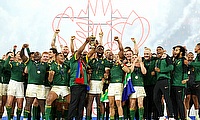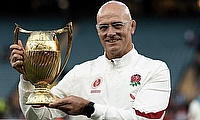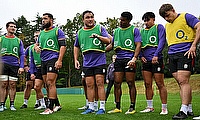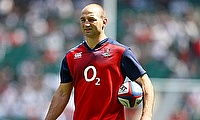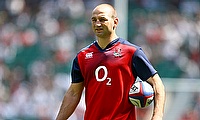Exclusive: Peter de Villiers on Rassie, refs and SA Rugby
Coming into their final Test of the year against England at Twickenham Stadium, the narrative surround the Springboks has been one of great unrest.
This comes largely as a result of the team’s Director of Rugby Rassie Erasmus having been banned for the final two games of the Autumn Nations Series. The root cause of that ban is social media posts seemingly aimed at referees, although the 50-year-old tried to suggest that the posts were public displays of self-reflection.
Over the week, Boks head coach Jacques Nienaber has had to face questions around his long-term associate, World Cup winning captain John Smit has said that South Africa have been made “easy to dislike” and Eddie Jones has joked that the South African might make his way into Twickenham on Saturday by way of a laundry basket, à la Jose Mourinho.
“I was also aggrieved when guys in the game banned Bakkies Both for the Lions tour in 2009 and we wore the white armbands,” Peter de Villiers told TRU. “I can’t actually judge.
“If it comes to refereeing, you must understand that the game needs those people. It’s a job that I’d never want.”
When it comes to ruffling feathers, former Springbok coach Peter de Villiers isn’t unaccustomed. The first black coach to lead his country, the 65-year-old was South Africa’s coach from 2008 until the conclusion of the 2011 Rugby World Cup in New Zealand.
In 2010 De Villiers faced a misconduct haring for comments he made about Tri-Nations referees, last year took to social media to stress the need for improved refereeing standards in South Africa and the name of his autobiography? Politically Incorrect.
For Erasmus, this is his second ban for a similar offence. During the 2021 British and Irish Lions tour of South Africa, the Director of Rugby released an hour long video criticising referee Nic Berry, the World Cup winning coach ultimately banned from all rugby activities for two months, while also being suspended from all matchday activities until September this year.
Erasmus’ ban came some over two months following his 62-minute tirade, in which he cited 36 separate incidents, with de Villiers of the belief that the game’s governing body must shoulder some of the criticism too.
“I think World Rugby is to blame for it too,” de Villiers said. “In the first place, they didn’t take any action immediately. They made it such a long and drawn out thing.
“The morale of the story is ‘did you overstep?’, ‘yes’ and then you are getting a ban for it. They made it a three month thing. In the three months, the supporters might think ‘maybe he [Erasmus] is right, maybe he should do it’.
“You are not actually stomping your authority. You are in control of rugby. Everybody else, because they voted you in, they will adhere to the laws and the rules we have sent to you and you have signed off, and this is how we are going to run it.”
When it comes to World Rugby, de Villiers is also of the belief that the game has become too confusing. With such constant rewriting of the lawbook, he even talks about how he went to a mall last weekend following a training session with SA Deaf Rugby while the Springboks game was on and hundreds of people were talking around in South Africa apparel.
It leads to a disconnect between people and the game, as well as taking away from the athletes on the field and putting too much emphasis on those with the whistle.
“If you look at netball, if you look at soccer, you look at basketball, you look at all these games; they all remain the same,” de Villiers explained. “It is only rugby that has changed its laws every year.
“The great thing is how clever you can become. Every game you are waiting for new laws to tell your players and suddenly the whole thing is so confusing, but at the end everybody has got to make a living.
“We don’t care about this game anymore, we don’t actually have a passion for this game anymore, because it became work.
"We have to go to work because somebody is paying us to do it and then the guys who were very invisible when I played the game, the referees – sometimes you didn’t even know there was a referee on the field – they became the most prominent people.
“I don’t think it is doing justice to the game. The last thing I want to say about referees; when I played the game, the referee was the sole judge of the game. He took responsibility for whatever he did. If you look at referees today; ‘it’s not me, it’s my TMO’, ‘it’s not me, it’s the assistant referees’.
“Everybody is blaming everybody and nobody is taking responsibility for anything and we have paid million and billions of dollars to go and watch the game.”
This whole social media saga has divided people. Many are either sympathetic towards Erasmus or completely the opposite. And when those two sides clash, it is a quite spectacular war of words. Or beating of a keyboard.
Earlier this week, de Villiers’ former captain John Smit poked his head above the parapet. Speaking on the BBC’s Rugby Union Daily podcast, the 44-year-old expressed how it was difficult to defend the coach and how Erasmus’ action may well be detrimental to whatever South Africa team steps out onto the field.
“John is the best rugby captain that World Rugby ever saw,” de Villiers said. “Then Victor [Matfield, de Villiers’ vice-captain] – these are guys that live by a value system and they honour the game so much.
“What they understand is, if you do not do what the referee wants you to do, they will turn against you. What I normally call referees are attorneys.
“A labourer will tell you how bad you are, while attorneys will come with professional jealousy, and they will never turn on each other.
“Referees are the same, they will never tell on each other, and when somebody goes out there, they will go out in mind with what you have done to them.
“So, all the 50/50 calls will go against South Africa, and that is what John as a captain doesn’t want.
“As a captain you are responsible for the result on the field, and it is making it hard on your captain if you turn the people making the decision against you.”
That topic of values and honour is something that crops up on several occasions over this 30 minute or so conversation. They come from de Villiers’ faith; the 65-year-old having taken what he learnt from the Bible into the classroom first before becoming a full-time rugby coach.
Inherently, that belief is something that the current SA Deaf Rugby head coach sees as missing from those that administrate the game in South Africa.
He has been critical of South Africa’s governing body in the past, saying ahead of the 2019 Rugby World Cup that he would not be supporting the Boks after Eben Etzebeth was not banned following accusations of racism prior to the tournament.
At the time of writing this article, SA Rugby are yet to make an official statement on Erasmus’ ban, something which de Villiers sees as a small part of the bigger picture.
“SARU [SA Rugby’s former name] is actually a disgrace at this stage, because they don’t stamp their authority on the value system of how the game should be run and what you should do and what you shouldn’t do,” de Villiers said.
“I don’t think SARU run rugby anymore. I think they are just there because somebody has just elected them to be there. I think they are a disgrace. They don’t make decisions on anything.
“They don’t come out around all the other stuff that is off the field around the team. I don’t expect them to make any decisions on these things, I just expect them to be there because there is some freebies for them to be at Test matches.
“You can calculate everything that SARU has not done. There is no regulations, there is no values system.
“I am so glad I don’t have a boy, because I don’t think I want to let him loose in a lion’s den like this where the values that you try and bring across as a human being and a good citizen is being broke apart by sport.”
For these reasons, as far as de Villiers is concerned, it is almost impossible blame Erasmus for his actions entirely.
“This is not about Rassie, Rassie can do whatever he wants to do,” he said. “It’s not about Rassie, it’s about the authorities, the bosses that Rassie is working for.
“They are the ones who have to set the trend and say ‘woah, woah, woah, stop right there’, you know? They are absent, and through their absence everyone will do what they want to do and you can see why the world is in such a mess; because our leaders don’t lead anymore.
“They lead from behind. They first want to see what mess is there, what everybody wants, and they make that the rule because they test the water before they put their foot in there.”

